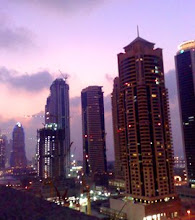 Some easy New Year’s predictions:
Some easy New Year’s predictions: Monday, December 31, 2007
Blessed be the firework makers
 Some easy New Year’s predictions:
Some easy New Year’s predictions: The personal touch
Tuesday, December 11, 2007
Du the math
In this morning’s Emirates Business 24/7, Osman Sultan, CEO of Du, admits to a similar compulsive disorder: he says he feels a “quiet sense of achievement” every time he answers a call from an 055 prefix.
He must be short on thrills. Despite Du claiming to have passed the one million-customers barrier, a straw poll of friends and colleagues suggests very few people are using a Du number. Etisalat numbers continue to dominate – people still assume mobile numbers start with an 050 prefix. For the most part, the only people using a Du number are new arrivals; many Etisalat customers have booked a Du number, but don’t use it.
This is hardly Du’s fault. With no room to wriggle on price, the UAE’s second mobile operator has limited means to differentiate itself from the incumbent (not helped by both preferring lower case); there is not much of a compelling argument for consumers to shift operators. ‘I have a Du number but Etisalat matches the package, so why should I change,’ says one colleague.
Du has stated it wants 30 per cent of the UAE market by 2009. What it doesn’t say is whether this by market value, traffic or prefix.
Monday, December 10, 2007
Silent Salik
 To the surprise of no one
To the surprise of no one Since Salik was introduced in the summer, the RTA has inched towards some degree of public interaction. There has been a sharp increase in the number of RTA ads appearing in press and billboards. It is now advertising its complaints line: 800 9090, http://ecomplain.dubai.ae, or fax to 04 206 5532. It might have been nice to flag up some concept of dialogue before the next phase of expansion: a suggestion that public feedback might be taken into consideration.
The RTA says the roll-out is part of “a major push to get people to use public transport”, reports Emirates Business 24|7 - though neither the RTA nor the paper bother to provide details of how. No details on tolls either.
There is nothing wrong in admitting this is a tax on drivers. Sailk is expected to raise Dh600m this year; details of how this money is being spent on tackling the traffic problem would be welcome. A public face for the RTA would be ideal.
Sunday, December 9, 2007
Tough business
 The UAE is a regional business center, UAE companies make the international news, the country needs a daily business paper. This appears to be the logic behind Arab Media Group’s relaunch of its Emirates Today title to Emirates Business 24/7. The new paper debuted on Sunday 9 December with the publisher confident it will become “an integral part of the life of top executives and decision-makers in the private and public sectors as well as a reference for investors”.
The UAE is a regional business center, UAE companies make the international news, the country needs a daily business paper. This appears to be the logic behind Arab Media Group’s relaunch of its Emirates Today title to Emirates Business 24/7. The new paper debuted on Sunday 9 December with the publisher confident it will become “an integral part of the life of top executives and decision-makers in the private and public sectors as well as a reference for investors”.
